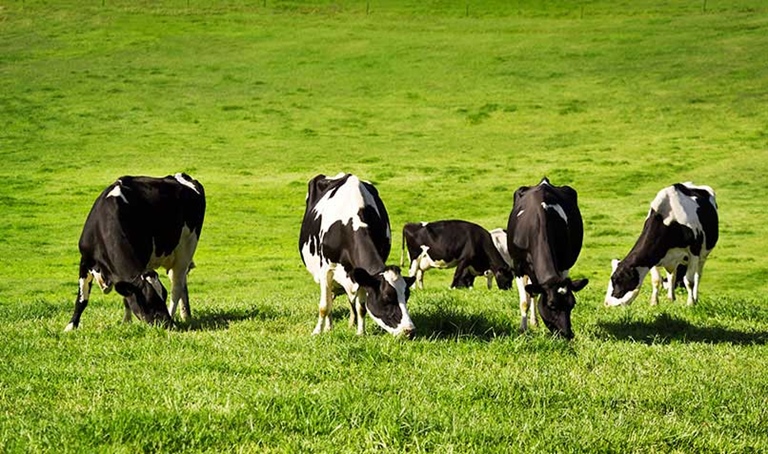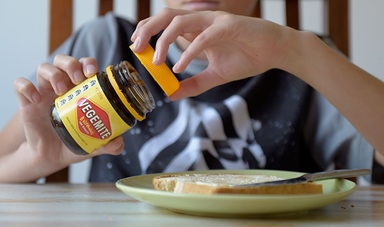Loading component...
At a glance
Story by Michelle Lindsay
When Barry Irvin was in high school, the last thing he wanted was to work in the dairy industry. Raised on a dairy farm that had been in the family for generations, he sought a different type of life.
Taking the best option available to a country boy of limited means, Irvin got a job in a bank as a teller.
He says that this humble start stamping cheques, checking signatures and giving cash instilled some key business values he’s taken with him throughout his career.
“My first manager at National Australia Bank (NAB) insisted that I remember my customers’ signatures – so I knew their names and they felt that they were known personally by the bank,” he says.
“I had to memorise thousands of names and signatures – but it taught me the value of true customer service.”
During the next decade, he worked his way up to the bank’s loans and business lending division. He says this gave him an important education in finance and banking – and a few cautionary tales.
“Working with businesses, you see the successes – but also the occasional disaster. I was always keen to understand what made some businesses succeed while others failed – that has always been a really strong reference point.”
When Irvin was in his early 20s his father died, leaving his mother and sisters struggling to run the family farm.
He opted to return home to the Bega Valley to take up the reins on the business. He only intended to stay for a year.
From co-op to corporation
Today, Irvin is a central figure in Australia’s dairy industry. His ability to understand the needs of dairy farmers, along with his financial acumen, first saw him appointed to the board of the small regional cooperative Bega Cheese more than 20 years ago.
Since that time, he has steered the business through significant structural change.
“Bega Cheese had been running as a cooperative since 1899. But I came to believe that it was time to restructure – so in 2009 we restructured to an unlisted company, then to a listed company in 2011.”
He says the restructures were necessary for the business to withstand the market forces unleashed by dairy deregulation.
"I believed that, to survive, we needed more size, more scale, more skill in other parts of the supply chain."
“When the dairy industry deregulated in 2000, there were a lot of dairy co-ops that existed that don’t exist today,” says Irvin.
“We were very keen to be a survivor, to expand and consolidate where we could and have a more flexible financial structure.
“There was a lot of fear in the industry at the time. My objective was to try and act. At the time, I suspect Bega Cheese was on the list of companies to be taken over or go broke,” he says.
“I believed that, to survive, we needed more size, more scale, more skill in other parts of the supply chain.”
Beyond dairy: a savvy strategy for survival
Irvin embarked on a strategy of clever contractual deals, and mergers and acquisitions.
“I wanted to talk to everyone in the industry about where the opportunities might come, and how to structure deals to strengthen the company and balance sheet.
"Looking back, there was an element of risk in what I was trying to do, but I was trying to batten down the hatches in a completely changed business environment.”
His first deal, finalised in late 2012, gave NZ firm Fonterra the licence to market and distribute the Bega brand. This enabled the company to consolidate its cheese packing, cutting and processing operations.
“That model meant we could bring in more volume, tripling production throughout our plants and growing our staff from 100 to 300. Because of the deal, some of our competitors became our customers. This isn’t something that people generally think about doing, but it actually helped us to become a large service provider.”
Next came a well-publicised but unsuccessful bid to take over Warrnambool Cheese and Butter Factory (WCB) in late 2013.
Following a robust three-way bidding war between Canadian dairy company Saputo, local company Murray-Goulburn, and Bega Cheese, the company chose to bow out of the race and sell its shares to Saputo.
“While we were unsuccessful, there was a handsome second prize. Selling our shares enabled us to strengthen our balance sheet, and released around A$100 million in cash flow.”
Irvin says that the decision to diversify beyond dairy came from the limited opportunities available in the sector, plus a broader view of the company’s core strengths.
“After the Warrnambool bid fell through, we realised that further consolidation within the dairy industry would be difficult – there wasn’t the scale or size of assets that would be helpful to our business,” he says.
While stepping outside the dairy industry was seen as a risk by some, he felt that the company was well prepared to take on the challenge.
“We had to think very deeply about the fact that this was outside our traditional strength, which was dairy,” Irvin says.
He increased the company’s exposure to the infant formula market, and took a stake in vitamin company Blackmores. However, in 2016, Bega Cheese lost a key contract with Coles to supply its Coles home-brand cheese.
It was also forced to write down the value of its infant formula investments due to falling demand in China, which saw the Blackmores share price dive by about 40 per cent in the three months to October.
Then, in January 2017, Irwin announced the deal that made headlines around the country – a A$460 million purchase of the Vegemite brand, part of Mondelez’s grocery business, worth about A$300 million in additional revenue.
Bega brings Vegemite home
Vegemite, born in Melbourne 95 years ago, is the first nostalgic Australian brand to return home after a string of international raids on Foster’s, Arnott’s, Uncle Toby’s and Aeroplane Jelly.
How did a company based on the far south coast of New South Wales seal a deal with a US multinational to bring the iconic brand home?
Irvin explains, “My philosophy in business is that relationships are important. We were very conscious of the Mondelez grocery business over a number of years.
"After the global financial crisis, we bought one of Kraft’s major assets at Strathmerton – manufacturing on their behalf – and at that time, we got to know a number of senior people at Kraft.

“When the Mondelez business was carved out of Kraft, we went from having Kraft as a customer to Mondelez, which also had the Cadbury business and the snacking business.”
He says that strong relationships put the company in a position where they could discuss how well the Vegemite brand and other Kraft brands fit with the Mondelez business.
“We were able to suggest that if they were ever thinking about whether that was the right fit for them in Australia, we would be very keen to talk to them.
“They came to a point where they thought that perhaps the assets sat better with us than with them, and hence the deal was done.
“In doing that deal, which was obviously a very sensitive deal, there were relationships that had gone back the best part of a decade, and even longer in some cases. It meant that we were able to work very constructively towards getting that deal done.”
Irwin also ensured there was a strong business case for bringing the iconic brand home.
“We performed substantial due diligence – we were aware that Vegemite is a very strong brand, and would stand up very well. We knew that it had transitioned from Kraft (with the licence to use the name expiring at the end of this calendar year).
“We had to satisfy ourselves that we could execute the appropriate transitions there, and that our existing relationships with retailers would stand us in good stead for the new products we’d be bringing.
“We were able to comfort ourselves that we were already accomplished manufacturers, with high-quality food processing facilities. As well as our own brand, we were bringing in other people’s products – including cheese and infant formula – and adding value.”
Financing the deal for Vegemite
When the acquisition from Mondelez was announced in January 2017, much was made of the fact that the company would need to access an existing A$500 million debt facility to make it happen – with some analysts expressing concern about the company’s high gearing levels.
Irvin, too, had seen the impacts when large business loans had gone bad during his days in banking, and was keen to reduce debt fast.
In March, Irvin announced that he had made a A$200 million deal to sell the company’s Derrimut infant formula canning factory in Melbourne, and its milk powder dryer at Tatura, to customer Mead Johnson.
This not only bolstered the balance sheet, but – under the terms of the sale – ensured ongoing access to product from the sites for the next 10 years to provide to Bega’s own customers.
Irvin then set about getting the company ready for growth – with a A$122.5 million institutional capital raising, and a share purchase plan for retail investors worth a further A$37.5 million.
“We got a wonderful response from the market to the capital raising, which did two things for us,” says Irvin.
“It clearly strengthened the balance sheet to where we wanted it to be, to reset us to take new opportunities. But it also gives us confidence because there are new opportunities out there and if we need to go to the market, we know the market is supportive of our strategy.”
Reaping the rewards: market gives thumbs-up to the return of Vegemite
After the January announcement of the deal, the Bega share price immediately rose 15 per cent, and it has continued to perform well ever since.
“The market responded very strongly to the announcement of the deal – even after the capital raise, the share price has continued to go up,” says Irvin.

He says that the response validates the company’s decision to grow and diversify outside dairy – and adds that future acquisitions are definitely on the cards.
“It’s clear that moves and acquisitions have really been the reason why Bega Cheese has grown from that small company that I joined all those years ago, into the business it is today,” he says.
“We are a growth company that now has a track record that makes us very, very confident in our capacity to not only identify opportunities, but also to execute them.
"We would expect to be continuing to scan the marketplace and we’ve got a balance sheet that allows us to think about the next step forward.”
Irvin passionately believes that the continued success of Bega Cheese – and companies like it – is critical to the prosperity of rural Australia.
“Our facilities are in towns and in the countryside. Our milks, our supply, obviously comes from dairy farmers across the country. Our success means that we invest more in our capacities, in our facilities, it means we employ more people.”
However, he says that to prosper in a global economy, Australian food businesses need to be more ambitious.
“There aren’t many Australian-owned food companies left. The global companies that have come and bought Australian food companies see the great strength and the great opportunities that will be there in the future for those companies.
“We need to be ambitious and expect to rival these companies, and expect to grow and create opportunity.
"It’s extremely important to the country in terms of export dollars and investments staying here, and development of assets and capabilities that are focused on the world, but created in Australia.”

